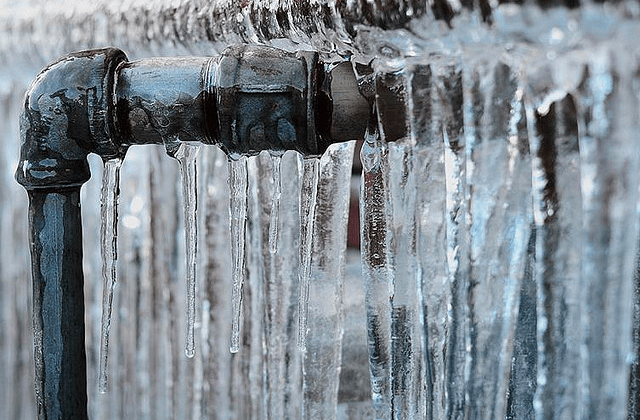This post down the page about How to Prevent Your Pipes From Freezing is quite remarkable. Give it a try and make your own findings.

Cold weather can wreak havoc on your plumbing, specifically by freezing pipelines. Right here's how to prevent it from taking place and what to do if it does.
Introduction
As temperature levels decrease, the risk of icy pipes increases, possibly resulting in pricey repair services and water damage. Recognizing exactly how to stop frozen pipelines is important for homeowners in chilly climates.
Prevention Tips
Shielding susceptible pipes
Cover pipelines in insulation sleeves or use heat tape to shield them from freezing temperatures. Concentrate on pipes in unheated or exterior areas of the home.
Home heating techniques
Keep interior spaces adequately heated, specifically areas with pipes. Open up cupboard doors to permit warm air to distribute around pipelines under sinks.
How to determine icy pipes
Try to find lowered water flow from faucets, uncommon smells or sounds from pipes, and visible frost on subjected pipelines.
Long-Term Solutions
Architectural adjustments
Consider rerouting pipes away from exterior walls or unheated areas. Add additional insulation to attics, basements, and crawl spaces.
Upgrading insulation
Purchase top notch insulation for pipelines, attic rooms, and walls. Appropriate insulation helps maintain consistent temperature levels and decreases the threat of frozen pipelines.
Shielding Outdoor Pipes
Yard hoses and outside taps
Separate and drain garden pipes prior to winter. Install frost-proof spigots or cover outside taps with shielded caps.
Recognizing Icy Pipelines
What causes pipes to freeze?
Pipes freeze when exposed to temperatures listed below 32 ° F (0 ° C) for expanded periods. As water inside the pipes freezes, it expands, putting pressure on the pipeline wall surfaces and possibly triggering them to rupture.
Risks and problems
Frozen pipes can lead to supply of water interruptions, residential property damages, and expensive repair services. Ruptured pipelines can flooding homes and create extensive structural damage.
Signs of Frozen Pipes
Identifying frozen pipes early can prevent them from breaking.
What to Do If Your Pipelines Freeze
Immediate activities to take
If you believe icy pipes, keep taps open up to eliminate stress as the ice melts. Use a hairdryer or towels taken in hot water to thaw pipes gradually.
Final thought
Avoiding icy pipes requires aggressive steps and fast actions. By understanding the reasons, indications, and safety nets, house owners can protect their plumbing throughout cold weather.
Helpful Tips to Prevent Frozen Pipes this Winter
UNDERSTANDING THE BASICS: WHY PIPES FREEZE AND WHY IT’S A PROBLEM
Water freezing inside pipes is common during the winter months, but understanding why pipes freeze, and the potential problems it can cause is crucial in preventing such incidents. This section will delve into the basics of why pipes freeze and the associated problems that may arise.
THE SCIENCE BEHIND FROZEN PIPES
When water reaches freezing temperatures, it undergoes a physical transformation and solidifies into ice. This expansion of water as it freezes is the primary reason pipes can burst. As the water inside the pipe freezes, it expands, creating immense pressure on the walls. If the pressure becomes too great, the pipe can crack or rupture, leading to leaks and water damage.
FACTORS THAT CONTRIBUTE TO PIPE FREEZING
- Low Temperatures: Extremely cold weather, especially below freezing, increases the risk of pipes freezing.
- Uninsulated or Poorly Insulated Pipes: Pipes located in unheated areas, such as basements, crawl spaces, or attics, are more prone to freezing. Insufficient insulation or lack of insulation altogether exacerbates the problem.
- Exterior Wall Exposure: Pipes running along exterior walls are susceptible to freezing as they encounter colder temperatures outside.
- Lack of Heating or Temperature Regulation: Inadequate heating or inconsistent temperature control in your home can contribute to frozen pipes.
PROBLEMS CAUSED BY FROZEN PIPES
WHY CERTAIN PIPES ARE MORE PRONE TO FREEZING
- Pipe Bursting: As mentioned earlier, the expansion of water as it freezes can cause pipes to burst, resulting in significant water damage.
- Water Damage: When pipes burst, it can lead to flooding and water damage to your property, including walls, ceilings, flooring, and personal belongings.
- Structural Damage: Prolonged exposure to water from burst pipes can compromise the structural integrity of your home, leading to costly repairs.
- Mold and Mildew Growth: Excess moisture from water damage can create a favorable environment for mold and mildew growth, posing health risks to occupants.
- Disrupted Water Supply: Frozen pipes can also result in a complete or partial loss of water supply until the issue is resolved.
https://busybusy.com/blog/helpful-tips-to-prevent-frozen-pipes-this-winter/
- Location: Pipes located in unheated or poorly insulated areas, such as basements, crawl spaces, attics, or exterior walls, are at higher risk of freezing.
- Exterior Pipes: Outdoor pipes, such as those used for irrigation or exposed plumbing, are particularly vulnerable to freezing as they are directly exposed to the elements.
- Supply Lines: Pipes that carry water from the main water supply into your home, including the main water line, are critical to protect as freezing in these lines can affect your entire plumbing system.
- Underground Pipes: Pipes buried underground, such as those connected to sprinkler systems or outdoor faucets, can be susceptible to freezing if not properly insulated.

Do you appreciate reading about Prevent Frozen Pipes ? Leave a comment down the page. We would be delighted to see your responses about this blog posting. Hoping that you visit us again before long. Liked our blog posting? Please quickly share it. Let other people check it out. Bless you for being here. Come back soon.
Contact Us Today
Comments on “Shielding Your Pipes from Cold Weather Damage: Essential Strategies”